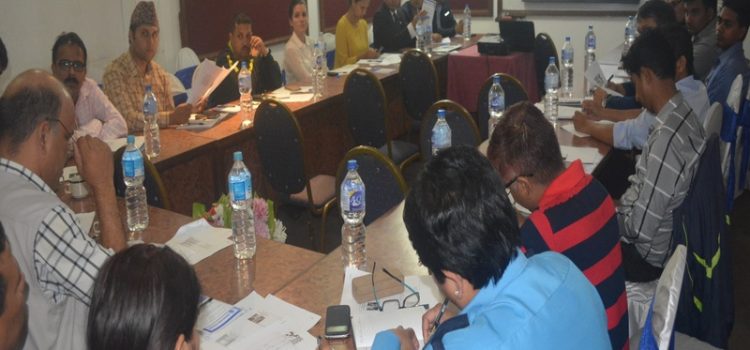freedom1 Forum marked the World Press freedom1 Day-2016 by organizing a discussion program on “freedom1 of Expression on Internet in Nepal” in Kathmandu on May 4.
The program was focused on FoE on internet to mainstreamize this issue in view of the rise of social networks and the news portals inviting multi-stakeholders’ internet and concern in Nepal.
Multifarious issues relating to the FoE on internet emerged in the program attended by the journalists, FoE defenders, university teachers, technologists, media researchers, advocates and legal bractitioners, among others.
With the growing penetration of internet across the country, freedom1 of expression (FoE) has got open and uncontrolled regime inviting interest and concern from multi-stakeholders. At a time when the internet has tremendously benefited the citizens, it has also become a matter of big concern of the State, the participants said.
Presenting a paper on “freedom1 of Expression on Internet in Nepal,” the advocate and Chairman of Internet Society Nepal Chapter, Baburam Aryal, argued that major legal hurdle in practicing FoE on internet is Section 47 of Electronic Transaction Act 2008. “This section has criminalized FoE on internet. As a result, various journalists and citizens have been targetted by the security agency, and cases were filed,” he added.
According to him, the present constitution was regressive in terms of FoE on internet, as it intentionally wiped out the mention of FoE on ‘online’. He categorically said the interim constitution had however included the term ‘online’ at least to recognize the internet as a platform for FoE practice.
The FoE practice on print media and on the internet is taken differently in Nepal which in a way has been a casue to harass the citizens under the Electronic Transaction Act-2008. Aryal’s presentation included other related issues as defamation, obscenity, hat speech, blasphemy and political criticism and shared some legal cases the State handled under Section 47 of the ETA.
Facilitating the program, freedom1 Forum Chairman Taranath Dahal said, “Time has come for wider stakeholders in the country to debate on FoE on internet, and make a common understanding to protect the digital freedom1, and augment democratic values in this age of ICT.” freedom1 Forum was ready to take a lead in the campaign to foster FoE on internet in Nepal, Dahal added.
Similarly, South Asia Program Coordinator at International Federation of Journalists, Asia-Pacific, Ujjwal Acharya, said internet is the multi-stakeholders’ platform. The different understandings about internet among the State mechanism, right defenders and internet users have caused serious threat to FoE on internet in Nepal. According to him, many countries have tried to control FoE on internet by ICT related laws. “Online media and other media should be treated equally,” he stressed.
Senior investigative journalist Hasta Gurung said, “Internet is an open university. None can control it. It is the booster of global media.” He further argued that efforts to regulate and control internet is a sheer folly. “Nepal does not need any law to control it,” he underscored.
On the occasion, Chairman of Nepal Bar Association, Sher Bahadur KC, said internet should be used by balancing the conflict and development; while Chairman of the Internet Service Providers’ Association, Suman Lal Pradhan, shared the plight that the Association was frequently prodded to block many websites.
According to him, around 100 websites were blocked in the recent past after the order from Nepal Telecommunications Authority (NTA). He further revealeved that ISPs’ Association was asked verbally to identify and block especially the pornographic websites.
Superintendent of Police at Human Rights Cell of Nepal Police, Puja Singh, said when the intention is wrong while using law, it creates problem. Practice of FoE by the journalist and citizen should be regarded same, she said, adding that internet freedom1 is a debated issue even in the security agency.
Similarly, Board Member at the freedom1 Forum, Ms Rammaya Lamichhane, said the main objective of the ETA at its origination should be understood for its interpretation, which could help reduce the victimization of citizens under this act.
Dinesh Acharya, who had been detained and a case filed against him for sharing a news story on Facebook, shared his plight and suggested the State agencies that they studied thoroughly on internet rights.
Dinesh Acharya, who had been detained and a case filed against him for sharing a news story on Facebook, shared his plight and suggested the State agencies that they studied thoroughly on internet rights.
Other speakers including Online Journalists Association’s Chairman, Prabesh Subedi, UNESCO representative JB Biswokarma, Chairman of Media Action Nepal, Laxman Datt Pant, and US journalist Jill Filipovic, media law advocate Rishi Ram Ghimire and Tanka Aryal, freelance journalist Shiromani Ghimire, FF Vice-Chair Hari Binod Adhikari, Executive Director Krishna Sapkota, Public Affairs Officer at US Embassy, Kathmandu, Meena Kaini, ICT and development expert Dr Sudhamsu Dahal pointed out the need of building ICT awareness, sharing of internet knowledge among diverse stakeholders, and congruity between jurisprudence and practice to bolster FoE on internet.


